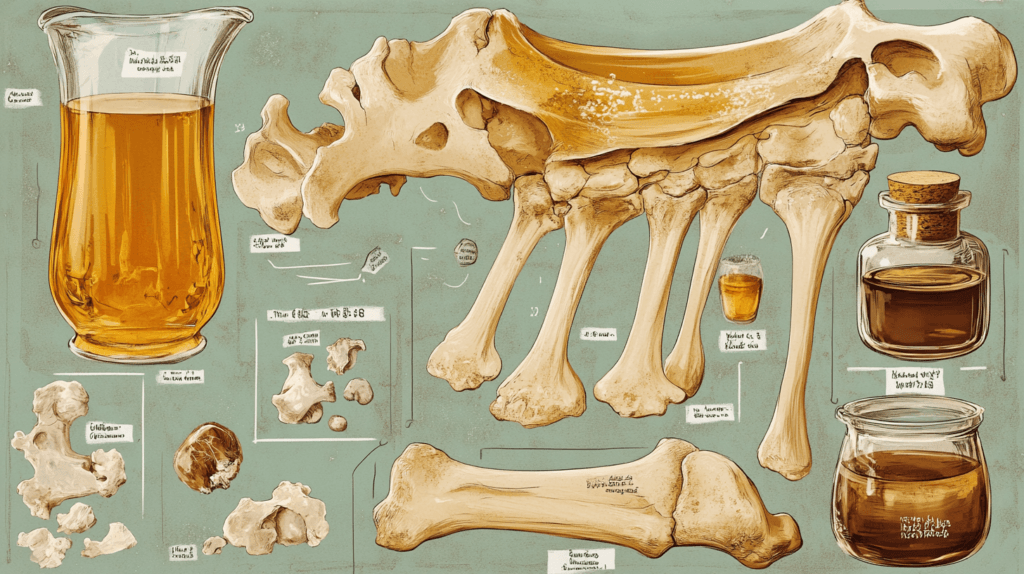Bone broth is a time-honored culinary staple with a rich history in various cultures. Known for its warming flavor and numerous health benefits, this nutrient-rich elixir has grown in popularity, especially in health-conscious communities. One ingredient often recommended in bone broth recipes is apple cider vinegar (ACV). But why is it added? From enhancing the broth’s nutritional profile to improving the extraction of minerals, apple cider vinegar plays a vital role. This article delves into the science, benefits, and practical tips for using ACV in bone broth.
Table of Contents
The Science Behind Bone Broth
What Is Bone Broth?
Bone broth is made by simmering animal bones and connective tissues for an extended period. The slow cooking process helps extract nutrients such as collagen, gelatin, and minerals, creating a savory, health-boosting liquid.

Nutritional Benefits of Bone Broth
Bone broth is celebrated for its high content of:
- Collagen and Gelatin: Vital for skin elasticity, joint health, and gut repair.
- Minerals: Such as calcium, magnesium, and phosphorus.
- Amino Acids: Including glycine and proline, which support metabolic and cellular functions.
The Role of Acidity in Cooking
Acidity is key in the cooking process when making bone broth. It helps break down tough connective tissues and dissolve minerals from bones, making them more bioavailable. Apple cider vinegar, with its natural acidic properties, is the ideal candidate for this role.
Apple Cider Vinegar: An Overview
What Is Apple Cider Vinegar?
Apple cider vinegar is a type of vinegar made by fermenting apple juice. It undergoes two fermentation processes, producing acetic acid, the compound responsible for its tangy taste and health benefits.
Nutritional Profile of Apple Cider Vinegar
ACV contains:
- Acetic acid: Aids in digestion and nutrient absorption.
- Trace minerals: Including potassium and magnesium.
- Polyphenols: Antioxidants that combat oxidative stress.
Popular Uses in Cooking and Health
From dressings and marinades to home remedies for digestion, apple cider vinegar is versatile. Its use in bone broth capitalizes on its ability to enhance nutrient extraction and boost the broth’s health benefits.
The Role of Apple Cider Vinegar in Bone Broth

How Acidity Helps Extract Nutrients
The acidic nature of apple cider vinegar breaks down collagen, gelatin, and minerals from the bones during cooking. This ensures that the broth is packed with bioavailable nutrients, making it highly beneficial.
Enhancing the Flavor Profile
Adding a small amount of apple cider vinegar doesn’t overpower the taste of bone broth. Instead, it brings a subtle tang that complements the savory flavors of the broth.
Promoting Digestibility
ACV not only helps in nutrient extraction but also makes the final product easier to digest. The acetic acid stimulates the production of digestive enzymes, improving the absorption of nutrients from the broth.
Nutrient Extraction Process
Calcium and Minerals from Bones
One of the primary reasons for adding apple cider vinegar to bone broth is its ability to extract calcium and other essential minerals from the bones. The acidic properties of ACV dissolve these minerals, making them available in the broth. This results in a nutrient-dense liquid that supports bone health, muscle function, and overall wellness.
Collagen and Gelatin Formation
Collagen, a protein abundant in connective tissues, is broken down into gelatin during the simmering process. Apple cider vinegar accelerates this breakdown, ensuring that the broth becomes rich in gelatin. Gelatin is prized for its ability to support joint health, improve skin elasticity, and aid digestion.
The Effect of Vinegar Concentration
Using the right concentration of vinegar is crucial. Too little vinegar may not effectively extract nutrients, while too much can make the broth overly tangy. A balance ensures optimal extraction without compromising the broth’s flavor.
Benefits of Adding Apple Cider Vinegar
Boosting Bone Broth Nutritional Value
Adding apple cider vinegar enhances the nutritional profile of bone broth by increasing its mineral content and aiding in the extraction of collagen. This makes the broth a powerful ally for maintaining strong bones, healthy joints, and radiant skin.
Supporting Digestive Health
Apple cider vinegar contributes to better digestion by stimulating the production of stomach acids and enzymes. When consumed in bone broth, it can help soothe digestive issues, improve nutrient absorption, and promote a healthy gut.
Contributing to Overall Wellness
Bone broth made with apple cider vinegar becomes a holistic health booster. It provides essential nutrients that strengthen immunity, reduce inflammation, and support recovery from physical exertion or illness.
Why Add Apple Cider Vinegar to Broth?
Adding apple cider vinegar to broth helps extract essential minerals and nutrients from bones when making Chicken Bone Broth, enriching the broth’s nutrient profile. This simple step not only improves the taste but also maximizes the health benefits.
Key Benefits
- Improved Mineral Absorption: ACV’s acidity helps dissolve calcium, magnesium, and other nutrients from bones.
- Enhanced Gut Health: Like bone broth, apple cider vinegar supports gut healing, making it a great addition to your recipes. Discover how Bone Broth Heals the Gut effectively.
- Delicious Tangy Flavor: A splash of ACV balances the broth’s richness with a pleasant acidity.
How to Use Apple Cider Vinegar in Broth
Adding ACV to broth is simple. Start by adding 1–2 tablespoons to your broth recipe. It pairs perfectly with High-Protein Slow Cooker Recipes or can be used as a base for soups and stews.
Recipe: Nutrient-Rich Bone Broth with Apple Cider Vinegar
Here’s a quick recipe to try at home:
Ingredients:
- 2 lbs of bones (chicken, beef, or pork)
- 2 tablespoons of apple cider vinegar
- 1 onion, chopped
- 2 carrots, chopped
- 3 stalks of celery, chopped
- 8 cups of water
- Herbs and spices to taste
Instructions:
- Place bones in a pot or slow cooker.
- Add vegetables, herbs, and spices.
- Pour in water and apple cider vinegar.
- Simmer on low for 12–24 hours.
- Strain and store the broth for use in various dishes.
Bonus Tips for Broth Enthusiasts
Looking for more inspiration? Pair your apple cider vinegar-enhanced broth with dishes like Vegetarian Instant Pot Recipes for a creative and nutritious meal.
Practical Tips for Using Apple Cider Vinegar

Choosing the Right Type of Vinegar
Opt for raw, unfiltered apple cider vinegar with “the mother” for maximum benefits. The mother contains beneficial enzymes and probiotics that further enhance the health properties of the broth.
Recommended Amount of Vinegar to Use
Typically, one to two tablespoons of apple cider vinegar per gallon of water is sufficient. This quantity ensures proper nutrient extraction without overpowering the flavor of the broth.
Timing for Adding Vinegar During Cooking
Add apple cider vinegar at the beginning of the simmering process. This allows the acidity to work throughout the cooking, maximizing nutrient extraction.
Common Questions About Apple Cider Vinegar in Bone Broth
Can You Use Other Vinegars?
Yes, other vinegars like white vinegar or wine vinegar can be used in bone broth. However, apple cider vinegar is often preferred due to its mild flavor and additional health benefits, such as probiotics and polyphenols.
Does It Change the Taste of the Broth?
When used in the right amount, apple cider vinegar has a minimal impact on the flavor of the broth. It adds a slight tanginess that enhances the overall taste without overpowering it. Overuse, however, can make the broth too acidic.
Is Apple Cider Vinegar Necessary?
While apple cider vinegar is not absolutely essential for making bone broth, it significantly enhances the nutrient extraction process. If you prefer not to use ACV, other acidic ingredients, like lemon juice, can serve as substitutes.
Frequently Asked Questions (FAQs)
How much apple cider vinegar should you add to bone broth?
The ideal amount is 1–2 tablespoons of apple cider vinegar per gallon of water. This ensures effective nutrient extraction without altering the taste excessively.
What if you don’t have apple cider vinegar?
If you don’t have apple cider vinegar, alternatives like lemon juice, white vinegar, or balsamic vinegar can be used. Each provides the necessary acidity for nutrient extraction.
Can you make bone broth without vinegar?
Yes, but the nutrient extraction may be less effective. Vinegar helps dissolve minerals and collagen from the bones, enriching the broth. Without an acidic component, the broth will lack some of its nutritional potency.
Is apple cider vinegar safe for everyone?
Apple cider vinegar is generally safe in small amounts. However, individuals with acid reflux, stomach ulcers, or sensitivities to vinegar should use it sparingly or consult a healthcare provider before adding it to their diet.
Does apple cider vinegar affect broth quality?
Yes, in a positive way! Apple cider vinegar improves the quality of bone broth by enhancing its nutrient profile, flavor, and digestibility. When used in moderation, it elevates the broth to a more health-supportive level.
Conclusion
Apple cider vinegar is a simple yet transformative addition to bone broth. Its ability to enhance nutrient extraction, boost flavor, and support digestion makes it a valuable ingredient. Whether you’re preparing bone broth for its health benefits or as a flavorful base for soups and stews, adding apple cider vinegar ensures you’re getting the most out of this traditional remedy. With the right approach and balance, it can elevate your bone broth to a nutrient-rich powerhouse that supports overall wellness.

Apple Cider Vinegar in Broth
Equipment
- Large stockpot (6–8 quart)
- Knife
- Cutting board
- Measuring cups and spoons
- Fine-mesh strainer or cheesecloth-lined colander
- Ladle
Ingredients
- Liquid Base:
- 10 cups filtered water
- 2 tablespoons raw unfiltered apple cider vinegar
- Vegetables & Aromatics:
- 1 medium onion quartered (skin on if organic, for extra flavor)
- 2 carrots peeled and roughly chopped
- 2 celery stalks roughly chopped
- 3 garlic cloves smashed
- 1- inch piece fresh ginger sliced (optional, for extra warmth and healing)
- Herbs & Spices:
- 2 bay leaves
- 1 teaspoon whole black peppercorns
- Salt to taste (about 1–2 teaspoons)
- Optional A few sprigs of fresh thyme or rosemary
- Optional A handful of shiitake or cremini mushrooms for an umami boost
Instructions
- Combine Liquids:
- In a large stockpot, add the 10 cups of water and 2 tablespoons of apple cider vinegar. (If you were making a bone broth, you’d let the vinegar-water mixture stand for 10–15 minutes first to help extract minerals—but for this vegetable-forward broth, you can proceed immediately.)
- Add Vegetables & Aromatics:
- Place the onion, carrots, celery, garlic, and ginger (if using) into the pot. Add the bay leaves, whole peppercorns, and any optional herbs or mushrooms.
- Simmer:
- Bring the mixture to a boil over medium-high heat. Once boiling, reduce the heat to low and let the broth simmer gently for 45–60 minutes. During simmering, skim off any foam or impurities that rise to the surface.
- Strain & Season:
- Remove the pot from heat. Strain the broth through a fine-mesh strainer or cheesecloth into a clean bowl or another pot. Taste and season with salt as needed. Adjust with a little extra apple cider vinegar if you prefer a tangier kick.
- Serve:
- Ladle the warm broth into cups and enjoy as a comforting, digestive tonic. Alternatively, let it cool and store in the refrigerator for up to 3 days (or freeze for longer storage) to use as a base in other recipes.
- Details
- Prep Time: 15 minutes
- Cook Time: 60 minutes
- Total Time: 75 minutes
- Yield: Approximately 6 servings (1 cup per serving)
- Category: Broth / Soup
- Method: Simmering
- Cuisine: Health/Detox
- Diet: Gluten-Free, Paleo, Keto, Whole30
- Keywords
- apple cider vinegar, broth, detox, healing, gut health, immune boosting, nourishing, clean eating, digestive tonic
- Nutrition (Approximate per 1 cup serving – 240 ml)
- Calories: ~50
- Sugar: ~4 g
- Sodium: ~120 mg (variable based on salt added)
- Fat: 0 g
- Saturated Fat: 0 g
- Unsaturated Fat: 0 g
- Trans Fat: 0 g
- Carbohydrates: ~10 g
- Fiber: ~2 g
- Protein: ~2 g
- Cholesterol: 0 mg
- Note: Nutritional values are estimates and can vary based on ingredient brands and exact measurements.
Notes
Bone Broth Variation: For a richer, mineral-dense version, add cleaned beef or chicken bones to the pot. In this case, let the vinegar-water mixture sit with the bones for 10–15 minutes before adding the vegetables and extend the simmering time to 3–4 hours.
Vinegar Caution: Raw apple cider vinegar is potent. Ensure it’s well diluted in the broth to avoid irritation; you can adjust the amount to suit your taste.
Storage Tips: This broth keeps well in the refrigerator for up to 3 days. For longer storage, freeze in individual portions.
Customization: Feel free to experiment with additional vegetables (like leeks or parsnips) or spices (such as a dash of cayenne pepper) to tailor the broth to your preference.
